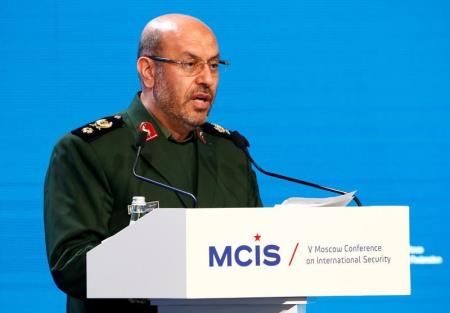Leonardo da Vinci's DNA found in 6 living relatives after 500 years
Iran confirms new missile test, says did not violate nuclear deal

Reuters (File photo) / Iranian Defence Minister Hossein Dehghan delivers a speech as he attends the 5th Moscow Conference on International Security (MCIS) in Moscow, Russia, April 27, 2016.
Iran’s defence minister said the Islamic Republic had tested a new missile, confirming earlier reports, Tasnim news agency quoted him as saying on Wednesday.
Hossein Dehghan said the test did not violate the country’s deal on its nuclear programme or the United Nations Security Council’s resolution.
“The recent test was in line with our plans and we will not allow foreigners to interfere in our defence affairs,” he said.
A U.S. official said Iran on Sunday test-launched a medium-range ballistic missile that exploded after travelling 630 miles (1,010 km).
The Security Council held an emergency meeting on Tuesday and recommended the matter of the missile testing be studied at committee level. The new U.S. ambassador to the United Nations, Nikki Haley, called the test “unacceptable”.
Iranian Foreign Minister Mohammad Javad Zarif said on Tuesday that Tehran would never use its ballistic missiles to attack another country.
Some 220 Iranian members of parliament reaffirmed support for Tehran’s missile programme, calling international condemnation of the tests “illogical.”
“The Islamic Republic of Iran is against weapons of mass destruction, so its missile capability is the only available deterrence against enemy hostility,” the lawmakers said in a statement carried on state media on Wednesday.
The state news agency IRNA quoted Ali Shamkhani, head of Iran’s National Security Council, as saying Iran would not seek “permission from any country or international organisation for development of our conventional defensive capability”.
The Security Council resolution was adopted to buttress the deal under which Iran curbed its nuclear activities to allay concerns they could be put to developing atomic bombs, in exchange for relief from tough economic sanctions.
The resolution urged Tehran to refrain from work on ballistic missiles designed to deliver nuclear weapons. Critics say the resolution’s language does not make this obligatory.
Tehran says it has not carried out any work on missiles specifically designed to carry nuclear payloads.
The test on Sunday, according to U.S. officials, was of a medium-range ballistic missile, a type that had been tested seven months ago as well.
Iran has one of the Middle East’s largest missile programmes but its potential effectiveness has been limited by a poor record for accuracy.
However, Hossein Salami, deputy head of Iran’s powerful Revolutionary Guards (IRGC) said on Sunday, the day of the test, that the country was now one of the few whose ballistic missiles were capable of hitting moving objects.
Such a capability would enable Iran to hit enemy ships, drones or incoming ballistic missile.
Some of Iran’s precision-guided missiles have the range to strike its regional arch-enemy Israel.
On Monday, Israeli Prime Minister Benjamin Netanyahu called Iran’s new missile test a “flagrant violation” of the U.N. resolution. He said he would ask Trump in their meeting in mid- February for a renewal of sanctions against Iran.












Leave a Reply
Be the First to Comment!
You must be logged in to post a comment.
You must be logged in to post a comment.